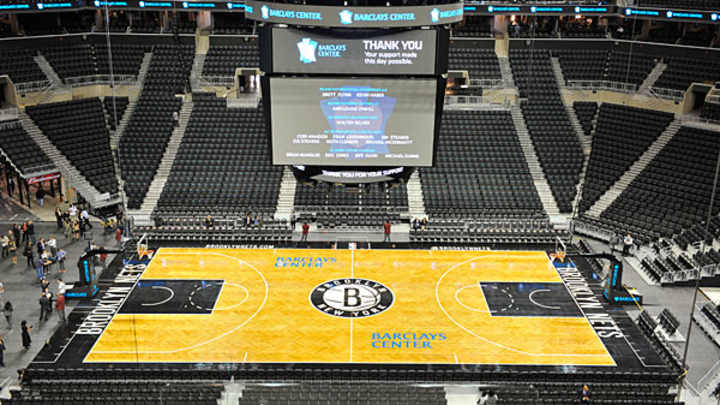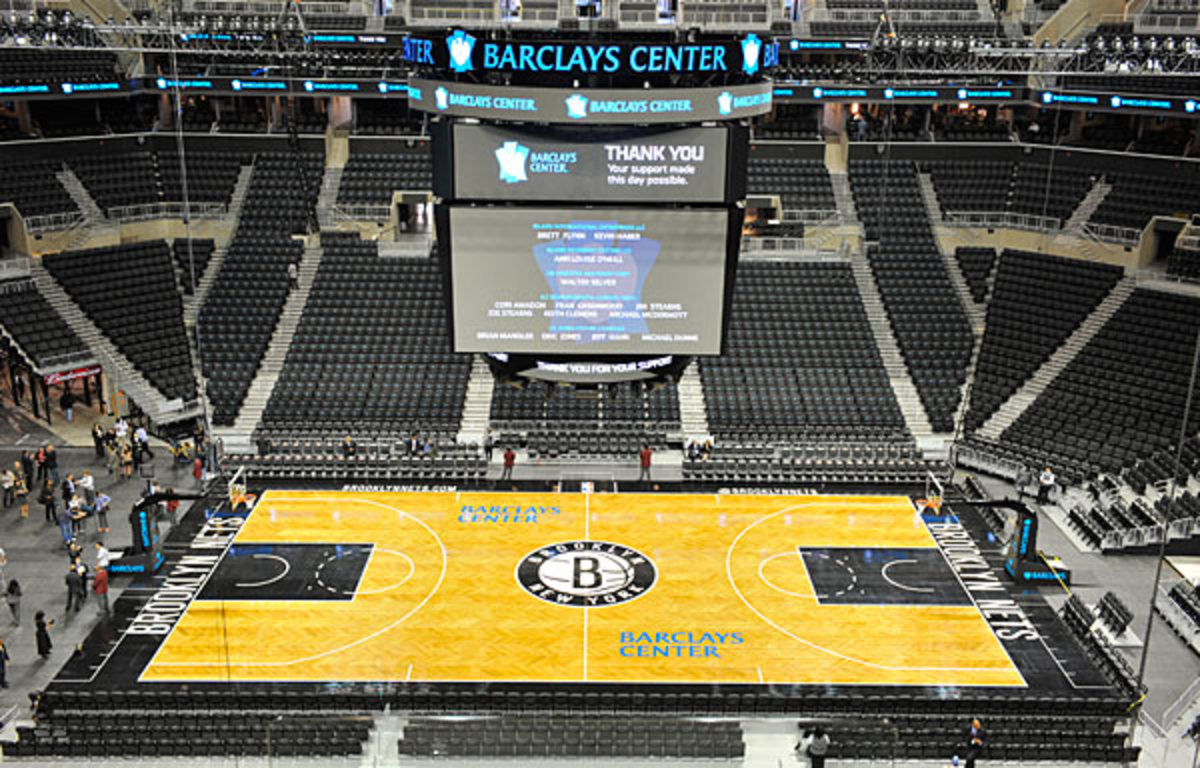New arena may bite Isles fans' wallets

The Islanders' future home was designed for basketball and concerts, not hockey. (David Dow/NBAE/Getty Images)

By Stu Hackel
Gary Bettman is not worried. The seating capacity for hockey games at Brooklyn's Barclays Center could be the smallest in the NHL. The commissioner said, as far as he's concerned, "It's not an issue."
But it may not entirely be a non-issue, either.
Bettman was among the speakers on Wednesday at the press gathering to announce that the New York Islanders have signed a 25-year lease to play their home games at the new arena starting in 2015-16. He cited the Winnipeg Jets, whose home at the MTS Centre officially seats 15,004 fans, as "doing well" (when they were actually playing hockey, that is, which the league is not at the moment). The Barclays Center will seat around 14,500 for hockey and Bettman said that number could increase to about 15,000. He added that, compared to the Isles' current home at the 16,234-seat Nassau Coliseum, "The thousand seats don't make a material difference."
Well, first, an extra thousand seats do make a difference. If the Islanders sold 1,200 more seats last season at their average ticket price, that would have represented an additional $2 million in revenue for Charles Wang's team. It's not a windfall, which is to say it wouldn't get the Isles out of the red, but it is $2 million.
Of course, there was no great demand for Islanders tickets, and it's been that way for too many painful campaigns. The Coliseum is considered to be a good part of the reason why, and so is the team's habitual mediocre-to-poor performance on the ice. This once great franchise has not won a playoff series since 1993 and has only qualified for the postseason four times since then.
But here's a bigger reason why Islander fans might find the small size of the Barclays Center problematic. Chances are that ticket prices for games in Brooklyn could end up being among the most expensive in the NHL.
With a reduced capacity, the team may be forced to charge a steep price in order to keep up with NHL economics, even after a reduction in the players' share of Hockey Related Revenue to 50-50 and even if the owners succeed in enacting other measures to keep salaries down through restrictions on individual contracting.
The Islanders' average ticket price last season was $49.06, which ranked 20th in the league (according to Team Marketing Report figures supplied by Hooked on Hockey). The Nassau Coliseum's capacity is actually the second smallest in the NHL, but the demand is also very low. Again, some of that is the bad building and some of that is the team's bad play. And we can add a third element to the reason why the price was so low: Long Island's regional economic picture is not what it once was, and tickets are priced accordingly.
Let's compare that to the Winnipeg model that Mr. Bettman invoked. The Jets' average ticket price last season was $98.27. That was second highest in the NHL, behind the Maple Leafs $123.77. There is great demand (the Jets sold every seat every game) and the 'Peg is doing well economically. But the scarcity of seats is also a factor: Scarcity increases prices and the Jets' owners, True North, ask their customers to pay a premium. That's also how they can generate enough revenue in their smaller building to be profitable -- which the Isles most certainly are not -- and have the resources to be competitive with other clubs.
Every club wants the ability to keep its better players when they become eligible for free agency and to shop for other UFAs; it's essential to building a winning team. When two-thirds of your competition has more than 18,000 seats available for their games and 10 clubs exceed 19,000, you must charge more, if only to have a decent war chest for the player market.
Of course, that's not the only factor in why the Islanders may have to charge more for tickets. They are going to be tenants in the Barclays Center. We don't know what the lease arrangements are, but the economics of owning your own building and keeping the money that comes in through ticket sales, parking, concessions and other amenities -- which Charles Wang wanted in a new Nassau County arena, but could not get -- are far more favorable to a hockey team than paying someone else for the use of their barn and getting only some, if any, of those other revenue streams. Whatever Islanders fans will pay for the experience of watching their team play in Brooklyn, Wang will have to fork over some of it to his landlord. He does that now at the Coliseum -- paying the owner, Nassau County, and arena management firm SMG -- and it was hardly working for him.
In three years, he'll have a state of the art building located in a more vibrant area (although Brooklyn's economic picture is not entirely shiny; but it's more favorable than Long Island), so he'll probably have increased demand. And he'll have even fewer tickets to sell than he now has at the Coliseum.
It's hard to know what the Isles price structure will be. It might not be as high as what Jets fans pay, but it might be more in line with what Rangers fans pay, and that averaged $66.20 last season, eighth highest in the league, and it went up this season to over $70, a jump of 9.5 percent. By 2015-16, who knows what those prices will look like?
Perhaps for many Islanders fans, who are just happy that their team is staying in the area, it won't matter. But certainly, a segment of them should prepare for sticker shock (on top of the increased cost of traveling from Long Island to Brooklyn for that major part of their fan base). Some could be instantly priced out of attending as many games as they'd like, or even entirely, when their team decamps to Brooklyn. And that's why, even though Gary Bettman doesn't think so, the smaller capacity at Barclays Center is an issue.
I have to say that I was wrong about the fate of this franchise. I was convinced it would stay in Nassau County and I wrote as much a few times (here and here for example). A good part of my belief was because Bettman was so strongly against a move, even to Brooklyn, and said repeatedly that the solution to the Isles' problems had to be found on Long Island. He said the fans on Long Island weren't likely to travel to Brooklyn if this team moved there. Others, like the intrepid B.D. Gallof -- the Islanders Independent blogger, Hockey Independent founder, and contributor to WFAN.com -- were convinced that this move was going to happen and stayed on it.
I also believed that the Rangers would oppose the Islanders moving a mere six miles away from Madison Square Garden. When the Isles were created, they paid the Rangers a fee for encroaching on their league-sanctioned territory which, until 1972, included Long Island. I always understood that to mean that the Islanders' home territory was designated as only Nassau and Suffolk Counties. But either I misunderstood or it somehow changed and came to include Brooklyn and Queens, the boroughs of New York City that are adjacent to Nassau County and which are geographically, but not politically, Long Island. Since a team does have the right to move inside their own territory, that interpretation gave the Islanders an avenue west. The New York Times reported in 2010 the Rangers-Islanders agreement was amended in 1986; I worked at the NHL at that time but was unaware of that.
In any case, even if the Rangers had the power to block the move, they might have had second thoughts. The Cablevision conglomerate that owns them and Madison Square Garden also has a long-term deal for the Islanders TV rights. With hope lost that the Isles would remain on Long Island, and faced with the possibility that they might end up in Kansas City or Quebec or Seattle -- meaning a loss of a valuable property for Madison Square Garden Network -- the Rangers' ownership could have decided not to resist. Or maybe they lacked any authority to stop them.
It's all moot now. The Isles will be in Brooklyn, playing in a modern, but oddly configured arena. I'm happy for their fans -- at least that segment that will be able to afford tickets.
COMMENTING GUIDELINES: We encourage engaging, diverse and meaningful commentary and hope you will join the discussion. We also encourage, but do not require, that you use your real name. Please keep comments on-topic and relevant to the original post. To foster healthy discussion, we will review all comments BEFORE they are posted. We expect a basic level of civility toward each other and the subjects of this blog. Disagreements are fine, but mutual respect is a must. Comments will not be approved if they contain profanity (including the use of abbreviations and punctuation marks instead of letters); any abusive language or personal attacks including insults, name-calling, threats, harassment, libel and slander; hateful, racist, sexist, religious or ethnically offensive language; or efforts to promote commercial products or solicitations of any kind, including links that drive traffic to your own website. Flagrant or repeat offenders run the risk of being banned from commenting.
